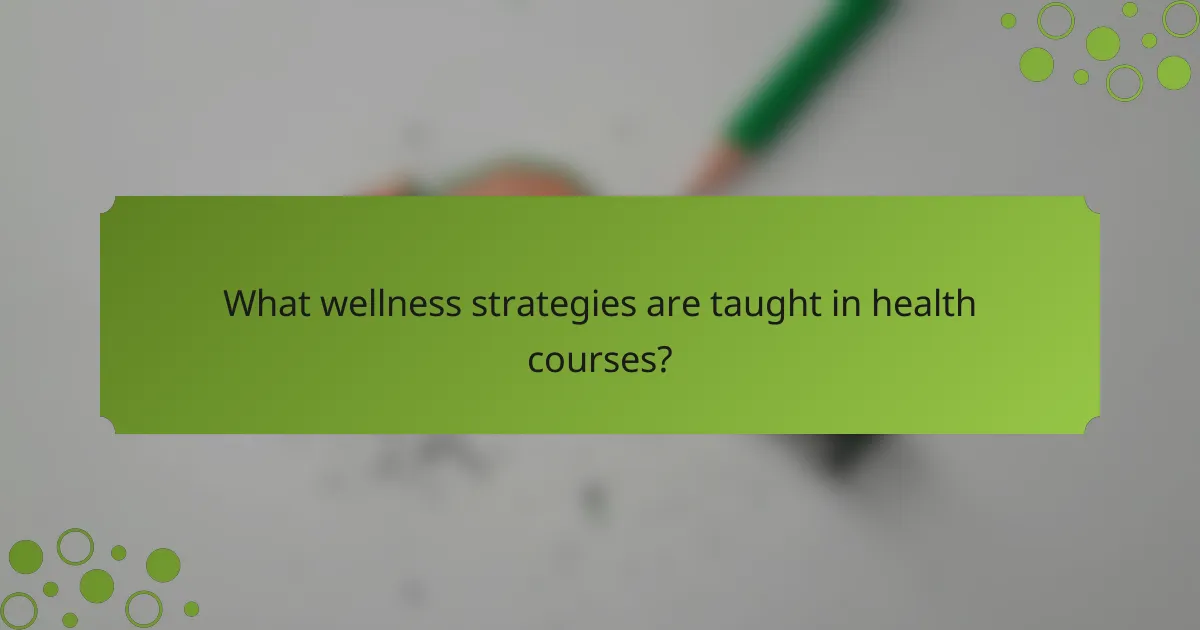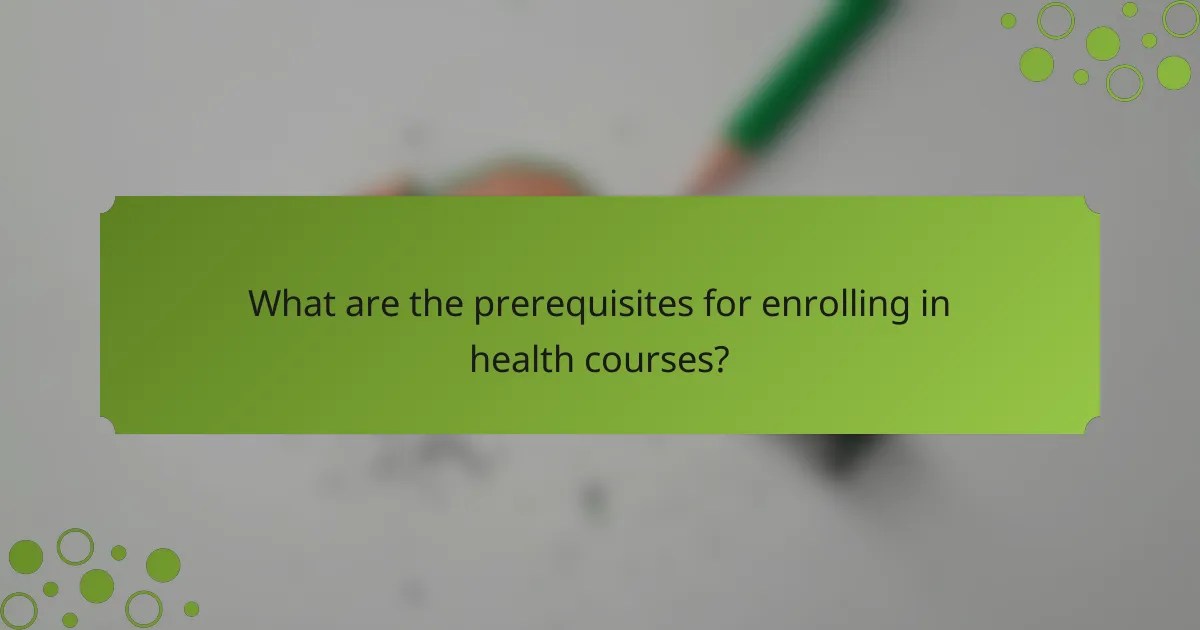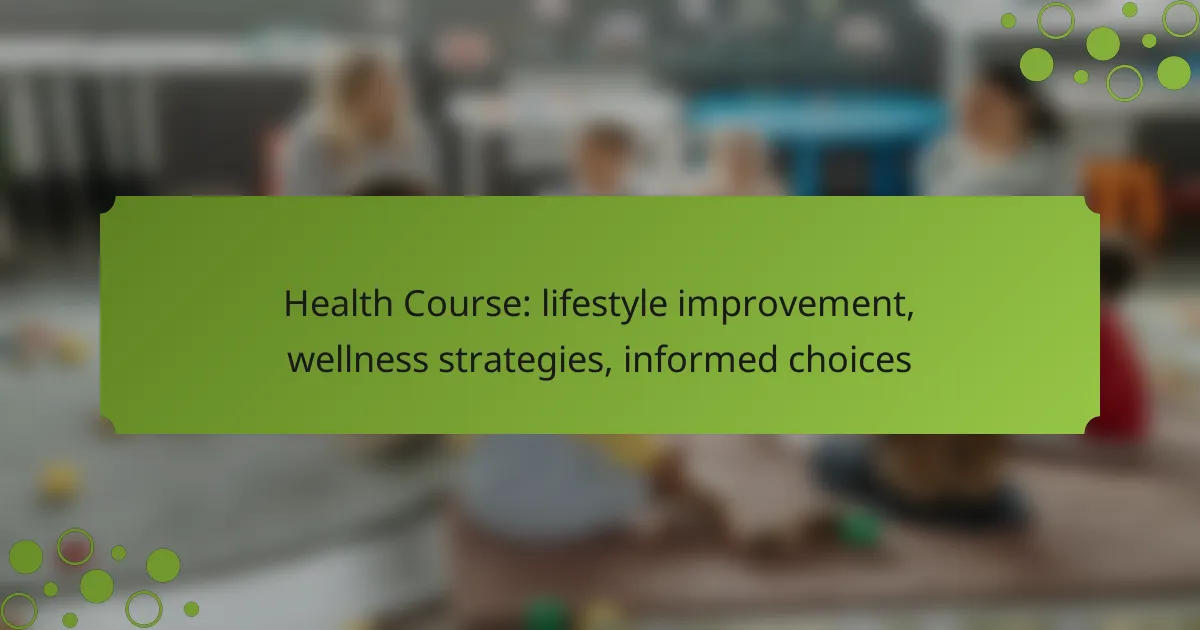Online health courses offer valuable resources for individuals seeking to improve their lifestyle through informed choices and effective wellness strategies. By focusing on key areas such as nutrition, stress management, and physical fitness, these courses provide practical tools that empower participants to adopt healthier habits. With flexible learning options and personalized support, individuals can enhance their overall well-being and make lasting changes in their lives.

How can online health courses improve lifestyle in Canada?
Online health courses can significantly enhance lifestyle choices in Canada by providing accessible education on wellness strategies and informed decision-making. These courses empower individuals to adopt healthier habits through flexible learning and personalized support.
Flexible learning options
Online health courses offer flexible learning options that cater to various schedules and lifestyles. Participants can choose when and where to study, making it easier to balance education with work and personal commitments.
This flexibility allows learners to progress at their own pace, which can lead to better retention of information and more effective lifestyle changes. Many courses are designed to fit into busy lives, with short modules that can be completed in a matter of minutes.
Access to expert instructors
Enrolling in online health courses provides access to expert instructors who bring a wealth of knowledge and experience. These professionals often include registered dietitians, fitness trainers, and mental health specialists who can offer valuable insights into wellness strategies.
Having direct communication with experts allows participants to ask questions and receive tailored advice, enhancing the learning experience. This interaction can help clarify complex topics and encourage informed choices regarding health and wellness.
Personalized wellness plans
Many online health courses include the development of personalized wellness plans, which are tailored to individual needs and goals. These plans often consider factors such as age, lifestyle, and health conditions, ensuring that recommendations are relevant and actionable.
Creating a personalized plan can help individuals set realistic goals and track their progress over time. This targeted approach increases the likelihood of successful lifestyle changes, as participants can focus on areas that matter most to their health and well-being.

What wellness strategies are taught in health courses?
Health courses typically teach a variety of wellness strategies aimed at improving overall lifestyle and well-being. These strategies focus on nutrition, stress management, and physical fitness, providing practical tools for making informed health choices.
Nutrition and meal planning
Nutrition and meal planning are essential components of wellness strategies. Participants learn how to create balanced meals that include a variety of food groups, ensuring adequate intake of essential nutrients. Understanding portion sizes and reading food labels are also emphasized to help individuals make healthier choices.
For effective meal planning, consider using a weekly template to organize meals and snacks. Aim for a balance of proteins, carbohydrates, and healthy fats in each meal. A practical tip is to prepare meals in advance, which can save time and reduce the temptation to opt for unhealthy options.
Stress management techniques
Stress management techniques are crucial for maintaining mental and emotional well-being. Health courses often cover methods such as mindfulness, deep breathing exercises, and time management skills. These techniques help individuals recognize stress triggers and develop coping strategies to handle them effectively.
Incorporating regular mindfulness practices, such as meditation or yoga, can significantly reduce stress levels. It’s beneficial to set aside a few minutes each day for these activities. Additionally, maintaining a balanced schedule that includes breaks and leisure time can help prevent burnout.
Physical fitness routines
Physical fitness routines are a key aspect of wellness strategies taught in health courses. Participants learn about different types of exercise, including aerobic, strength training, and flexibility exercises, and how to create a balanced fitness regimen. The goal is to promote regular physical activity tailored to individual fitness levels and preferences.
To establish a sustainable fitness routine, aim for at least 150 minutes of moderate aerobic activity per week, combined with strength training exercises on two or more days. It’s important to choose activities that are enjoyable, whether it’s dancing, swimming, or hiking, to maintain motivation and consistency.

How to choose the right health course?
Choosing the right health course involves evaluating its accreditation, the qualifications of the instructor, and the course format and duration. These factors ensure that you receive quality education and training that aligns with your wellness goals.
Course accreditation and reviews
Accreditation verifies that a health course meets specific educational standards. Look for programs accredited by recognized organizations, as this can enhance the credibility of your certification and improve job prospects.
Reading reviews from past students can provide insights into the course’s effectiveness and quality. Check platforms like Course Report or Trustpilot for honest feedback and ratings.
Instructor qualifications
The qualifications of the instructor play a crucial role in the quality of the course. Ensure that the instructor has relevant degrees, certifications, and practical experience in the health field.
Instructors with a strong background not only deliver content effectively but also provide valuable real-world insights. Look for bios or profiles that highlight their expertise and teaching experience.
Course format and duration
Consider the course format—whether it is online, in-person, or hybrid—as this affects your learning experience. Online courses offer flexibility, while in-person classes may provide more hands-on opportunities.
Duration is another important factor; courses can range from a few weeks to several months. Choose a length that fits your schedule and learning pace, ensuring you can commit fully to the program.

What are the benefits of informed health choices?
Informed health choices lead to significant improvements in overall well-being, mental health, and financial savings. By making educated decisions about lifestyle and wellness strategies, individuals can enhance their quality of life and reduce future health risks.
Improved mental health
Making informed health choices can greatly enhance mental well-being. Engaging in regular physical activity, maintaining a balanced diet, and practicing mindfulness are all strategies that contribute to reduced stress and anxiety levels.
For instance, studies suggest that individuals who exercise regularly report higher levels of happiness and lower rates of depression. Simple activities like walking or yoga can be effective in boosting mood and improving cognitive function.
Enhanced physical well-being
Informed choices about nutrition and exercise lead to better physical health. A balanced diet rich in fruits, vegetables, whole grains, and lean proteins supports bodily functions and helps maintain a healthy weight.
Additionally, regular physical activity strengthens the heart, muscles, and bones. Aim for at least 150 minutes of moderate aerobic activity each week, such as brisk walking or cycling, to reap these benefits.
Long-term health cost savings
Making informed health choices can result in significant long-term savings on healthcare costs. By preventing chronic diseases through healthy living, individuals can avoid expensive medical treatments and medications.
For example, maintaining a healthy weight and managing stress can reduce the risk of conditions like diabetes and heart disease, which are costly to treat. Investing in wellness strategies now can save thousands of dollars in the future.

What are the prerequisites for enrolling in health courses?
To enroll in health courses, individuals typically need a foundational understanding of health concepts and a willingness to engage in personal development. These prerequisites ensure that participants can fully benefit from the course content and apply it effectively in their lives.
Basic health knowledge
Basic health knowledge includes an understanding of nutrition, exercise, mental health, and preventive care. Familiarity with these areas allows students to grasp more complex topics and apply learned strategies to improve their wellness. For instance, knowing the food groups and their nutritional values can help in making informed dietary choices.
Many health courses may recommend prior completion of introductory courses or certifications, such as first aid or nutrition basics. This foundational knowledge can enhance the learning experience and facilitate discussions among peers.
Commitment to personal growth
A commitment to personal growth is essential for success in health courses. This involves being open to change, willing to reflect on one’s habits, and actively seeking improvement. Students should be prepared to set realistic goals and work consistently towards achieving them.
To foster this commitment, individuals can create a personal development plan that outlines their objectives, resources needed, and timelines. Engaging with supportive communities, whether online or in-person, can also provide motivation and accountability throughout the learning process.

How do health courses integrate technology?
Health courses increasingly incorporate technology to enhance learning and engagement. This integration includes online platforms, mobile applications, and interactive tools that facilitate access to information and foster community among participants.
Online Learning Platforms
Online learning platforms are a cornerstone of modern health courses, allowing students to access materials anytime and anywhere. These platforms often feature video lectures, quizzes, and forums for discussion, making it easier for learners to absorb information at their own pace.
Popular platforms like Coursera and Udemy offer a variety of health-related courses, often with certifications upon completion. This flexibility can cater to diverse schedules and learning preferences, making health education more accessible.
Mobile Applications
Mobile applications complement health courses by providing tools for tracking progress and implementing wellness strategies. Apps can range from fitness trackers to nutrition planners, enabling users to monitor their habits and make informed choices.
For example, apps like MyFitnessPal help users log their meals and exercise, while Headspace offers guided meditation sessions. These resources support the practical application of course content in daily life.
Interactive Tools and Resources
Interactive tools, such as virtual simulations and gamified learning experiences, enhance engagement in health courses. These resources allow learners to practice skills in a safe environment, reinforcing concepts through active participation.
For instance, simulations in courses on first aid or emergency response can provide realistic scenarios for students to navigate. This hands-on approach can improve retention and understanding of critical health concepts.



